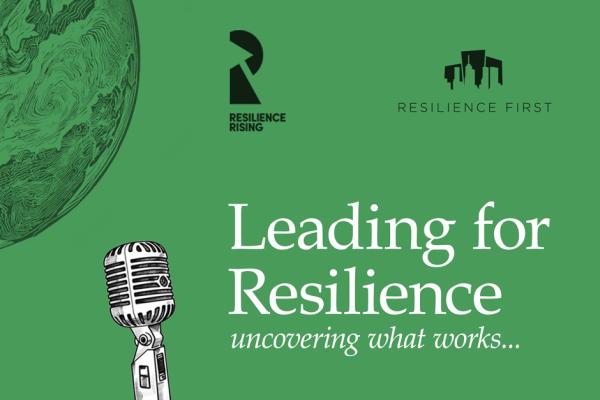The resilience of business, large and small, has been severely tested in recent years. The COVID pandemic – not away yet – with the fallout from the disruption to global supply chains and the more recent Chinese lockdowns. And then - when we hoped to see some recovery from COVID – the conflict in Ukraine, creating energy hikes not seen since the 1970’s and even more disruption to global markets, particularly for food commodities.
Resilience First was privileged recently to have NATO’s former Deputy Assistant Secretary General, Dr Jamie Shea, speak at one of our regular Leader’s Forums. He gave us his perspectives on the NATO approach to the Russia/Ukraine conflict and shared with us the four key lessons we are learning from it. If businesses are to enhance their resilience, then they’ll need to understand the risks that will continue to apply from the geopolitical dynamics of a conflict that looks set to be with us for a good while yet.
“The conflict exposes vulnerabilities in the West, but also presents opportunities for us to address them” says Dr Shea. “Take Germany’s reliance on Russian energy, as an example. It has gone from 50% dependency on Russian gas before the conflict to 28% today. But the cold turkey endured whilst finding alternative supplies can be painful. Political leadership in sustaining the course is crucial here.”
Dr Shea also maintains that the eventual rebuild of Ukraine will present opportunities for businesses too. He said, “The European Commission has established a Platform with the initial goal to capitalise it at €100 billion. As governments are providing the money, they will naturally want their companies to be able to compete. Ukraine will be hoping that its companies will get the lion’s share of the work to stimulate domestic employment. This suggests that there will be plenty of opportunities from corporate west/Ukraine joint ventures.”
So, what are the four key lessons we can take from the conflict?
The first of these has been the return to classical warfare. Cyber as a weapon has been less evident so far – although, this can be less noticed only emerging later. Ukraine, though, has previous experience of Russian cyber-attacks, and this has taken away the advantage to Russia of the unexpected. The use of artillery shells in Ukraine, however, is comparable to historical conflicts, as is the use of conscription to mobilise forces. A recent media release from one Ukrainian government organisation, put the number of Russian soldiers killed as of 02 August at over 41,000 with 1768 tanks, 4014 armoured vehicles and 223 military jets destroyed. The fighting has pitched comparable forces leading to a prolonged war of attrition and higher number of losses. Dr Shea comments, “We haven’t mobilised the supply chains for weaponry in the way we would have in previous wars. One consequence for the West, is that, without urgent planning, we may not be able to continue to supply Ukraine as current at the same time as maintaining supplies for NATO to cope with other eventualities. This may throw up the possibility of really tough decisions on future support for Ukraine for governments in the West.”
The second lesson concerns Russia using tactics that don’t follow the Hague Convention and are outside that expected in warfare. How, therefore, do we encourage future belligerents to abide by The Hague Conventions and the laws of war? This presents as a real difficulty if future conflicts use Ukraine as benchmark. In the current conflict, a humanitarian crisis is being created by damage to agriculture and grain within Ukraine (and not only at ports). Indeed, the Russian tactic of damaging infrastructure slows recovery and appears more about punishing a foe rather than achieving victory. “A failure to comply with the Hague Convention in future conflicts could see NATO having to cope with humanitarian issues from damage to critical infrastructure whilst trying to fight enemy forces at the same time” warns Dr Shea.
These lessons have an important bearing for future conflicts, particularly those involving non-NATO countries. Nancy Pelosi’s visit to Taiwan is seen as ill-advised by some and certainly appears to have antagonised China. China, though, has gained valuable insight on the Western response to aggression from recent events in Ukraine. Ukraine has been aided by a supply of western weaponry and the aggressor has been hit with economic sanctions. The latest view from Yale University in the US is that those sanctions are having an impact, particularly with difficulties in now accessing much-needed technology and materials affecting Russian manufacturing and productivity. Sanctions, as well as weapon supply, though, need to be sustained if they are to be effective and the West’s appetite for this in the longer term is questionable. A future adversary, with an eye for a non-NATO territory, will learn from this experience and watch, with interest, the NATO approach in the coming months.
The final lesson is one for business and for civil society in general. The current conflict has presented opportunities for the private sector to be involved in a way that we haven’t seen in previous wars. Much of this private sector involvement is voluntary such as in cyber activity in Ukraine or the use of satellite photography. We even had Elon Musk helping Ukrainians access the internet after the usual internet providers in Ukraine were disrupted by Russia. Western companies have strongly complied with the sanction ethos and in disinvesting from Russia. All this has been voluntarily offered by the western private sector and contrasts noticeably with the Russian experience during the conflict which has been very much state led. Of course, it remains to be seen whether the involvement of the private sector has been a positive impact (for the West and Ukraine) or a negative one. It could be argued that the more players in a field then the greater the risk of something going wrong. More intriguingly, if the private sector can show it can be influential in war, then could it look to influence future conflicts? Support from the western private sector for western involvement in the conflict in Ukraine has been strong – what if the private sector in the West wasn’t so keen on a future conflict – what bearing might that have on a government’s decision-making to offer support? Indeed, in an increasingly open digital age, how easy might it be for other players to influence business or public opinion rather than communications being restricted to the state?
Much can be learnt from the current conflict, therefore, and learning is a critical component in any resilience strategy. The UK is about to release its own National Resilience Strategy and we expect that it will advocate a greater role for business in resilience planning. Resilience First is collaborating with our member, the professional services firm, PA Consulting, on a blueprint for business on delivering whole society national resilience. This should be out before the end of this year.
NATO, too, is planning ahead. Last year, NATO set out its vision for 2030 with priorities for remaining strong militarily, becoming stronger politically, and taking a more global approach. In forming this vision NATO held a number of dialogues with the private sector. The significant role of business in areas such as data sharing, innovative technology and resilient infrastructure was noted. Further proof that, the business community will be even closer to the heart of resilience planning not just in the UK but throughout the western world.



